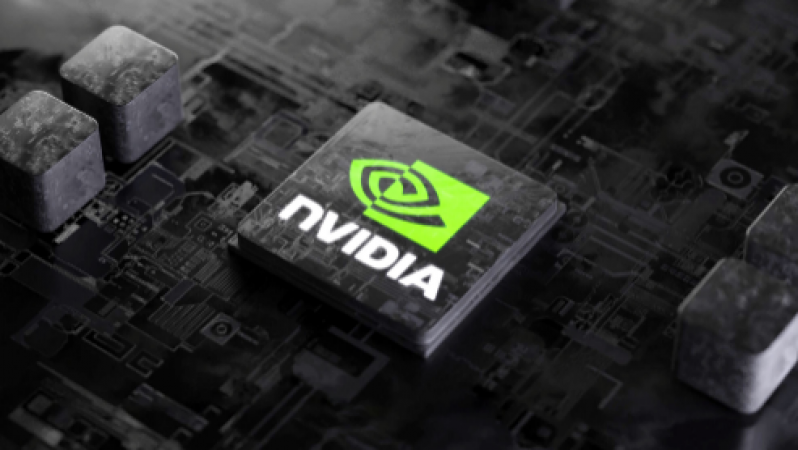
Washington: In a significant move reflecting escalating apprehensions over the potential weaponization of artificial intelligence (AI), the United States government has implemented export limitations on specific Nvidia chips to Middle East countries. The catalyst for this restrictive measure stems from mounting fears that these advanced AI chips could inadvertently contribute to the development of weapons of mass destruction.
The focal point of this export restriction pertains to the Nvidia A100 and H100 chips, integral components in the domain of artificial intelligence applications. Given the rapid proliferation of AI across multifarious sectors, including military applications, concerns have arisen that these chips might inadvertently fuel the creation of highly sophisticated weaponry.
At the heart of the US government's apprehension lies the possibility that these Nvidia chips could be harnessed to fabricate AI-enabled weapons of mass destruction. The specter of autonomous weapons endowed with the capacity to identify and engage targets independently, bereft of human intervention, is a troubling prospect that has driven this preemptive move.
Also Read: Google Empowers Indian Search with Generative AI: A Creative Evolution
To address these concerns, the US government has elected to impose stringent licensing prerequisites on the export of the Nvidia chips to Middle East nations. In practical terms, this implies that companies desiring to export these chips to designated countries within the Middle East will be mandated to secure a formal license from the US government.
The imposition of these licensing requisites is poised to exert profound ramifications on the burgeoning AI sector within the Middle East. By raising barriers to accessing cutting-edge AI technology, this decision could potentially hinder companies within these nations from acquiring and integrating the latest AI innovations.
This pivotal juncture in international tech trade underscores the intensifying global discourse surrounding the deployment of AI for military purposes. The United States government's proactive stance signifies its determination to forestall any inadvertent contributions to the creation of AI-powered instruments of mass destruction.
Also Read: iPhone 14 Pro is getting cheaper than iPhone 13! Will be tempted to buy after knowing the price
The decision to enact export restrictions on Nvidia chips has evoked a diverse spectrum of reactions, encapsulating both commendations and criticisms. Proponents of the decision laud the US government for adopting measures that preempt the inadvertent militarization of AI technologies. In contrast, critics argue that these restrictions could inadvertently impede the progress of AI research and development in the Middle East, potentially thwarting the region's ability to harness the full spectrum of AI benefits.
The impending consequences of this decision for the AI sector within the Middle East remain uncertain, underscoring the complexity of the issue at hand. Nevertheless, the US government's determination to address the latent perils of AI weaponization reinforces the gravity with which this matter is regarded at the international level.
The emergent narrative also emphasizes the intrinsic duality of AI technology — a force of immense promise and potential innovation, juxtaposed against the potential for misuse. This dynamic is poised to play a pivotal role in shaping the trajectory of global AI governance and collaboration.
As the export restrictions come into effect, several key considerations emerge:
Broader Security Discourse: The move spotlights the urgency of establishing international frameworks and agreements that regulate the responsible use of AI technologies. It underscores the necessity of dialogues aimed at mitigating the risks posed by weaponized AI.
Innovation versus Regulation: The conundrum between fostering technological innovation and averting potential dangers looms large. Striking the right balance is essential to ensure that AI technologies continue to evolve while being shielded from misuse.
Regional Impacts: The restrictions will undoubtedly reshape the AI landscape in Middle East nations. While some may perceive challenges, the situation could also prompt local innovation, collaboration, and the exploration of alternative avenues for AI advancement.
Ethical Considerations: The incident amplifies the ethical dilemmas associated with the development and deployment of AI. The global community must grapple with issues surrounding accountability, transparency, and the safeguarding of human rights in the era of AI proliferation.
In conclusion, the US government's imposition of export restrictions on Nvidia chips to Middle East countries is a testament to the growing recognition of the intricate relationship between AI and security. While this decision may bear far-reaching consequences for the Middle Eastern AI sector, its overarching purpose is to preempt potential misuse of AI technologies in the realm of warfare. This juncture beckons for a collective international effort to deliberate, strategize, and establish robust mechanisms to harness AI's potential while curbing its unintended consequences.
Also Read: This Indian company will launch a new bike every 3 months for 1 year
The narrative of AI, thus, evolves into a nuanced blend of innovation, diplomacy, and ethical discernment that resonates well beyond technology itself.